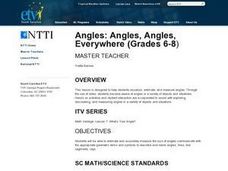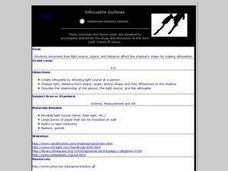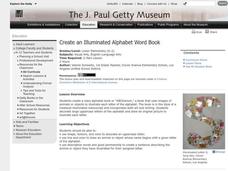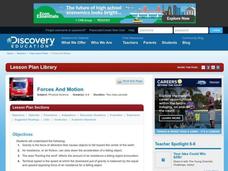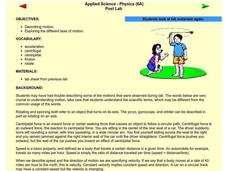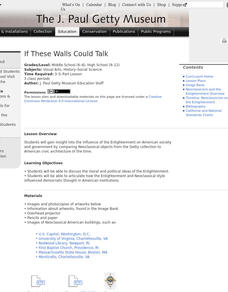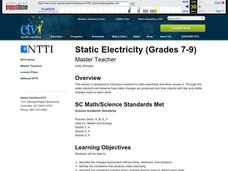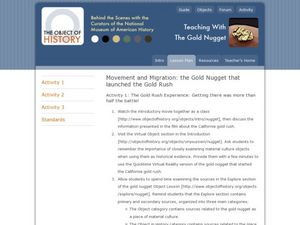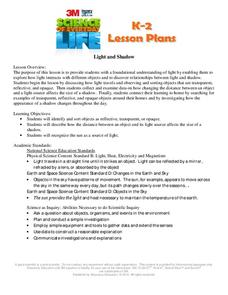Curated OER
Pollution Search
First graders identify forms of pollution and describe effects that various pollutants can have on people, wildlife, and plants; students describe relationships between various forms of pollution and human actions.
Curated OER
"Measurement in Motion"
Ninth graders examine the rate of motion and changes in motion using a ramp and a rolling object. They conduct the demonstration, determine the average speed, and describe how a moving object can have zero acceleration and deceleration.
Curated OER
Pieces of the Past
Students study the importance of preserving the archaeological record. They write a paragraph describing an object and why it is important to them. They cut their paper into a puzzle and compare their own to the student they trade with.
Curated OER
Angles: Angles, Angles, Everywhere
Students practice estiminating and measuring angles. After watching a short video, they identify angles in objects in the classroom and their homes. In groups, they participate in activities in which they are given a scenerio and are...
Curated OER
Ramps
Students experiment to see how various objects roll down ramps. In this ramp lesson, students observe weight, size, and material of objects. Students compare speeds by using a second ramp.
Curated OER
Motion: Speed, Velocity, Acceleration and Networking
Students interpret a variety of motion graphs. In this physics lesson, students calculate the speed and acceleration of objects using numerical data from graphs. They apply what they have learned to solve real world problems.
Curated OER
Gravity: It's GREEEAAATTT!
Students calculate effects of gravitational force on planets, discuss the effects of weightlessness on the human body and describe and demonstrate how objects in a state of free fall are accelerated by gravity at an equal rate.
Curated OER
Silhouette Outlines
Students create a silhouette by directing light at a person. They change the light, distance from the person and angle to make the shadows different. They are to describe the relationship between the light source and the object.
Mathematics TEKS Toolkit
Grade 6: Exploring c/d = pi
Introduce your math class to the perimeter of a circle. Teach them that pi describes the relationship between the circumference and the diameter. As a hands-on investigation, pairs or small groups use string to compare these two values...
Curated OER
Create an Illuminated Alphabet Word Book
Students create a class alphabet book. In this letter recognition lesson, students use line and color to draw an object whose name begins with a specific letter. Students use adjectives to create a sentence describing the object or...
Curated OER
Applied Science - Science and Math Post Lab
Students utilize a balance scale. For this applied science lesson, students compare the weights of two objects using an elementary balance scale. Students balance the scale with weights to find how heavy an object is.
Curated OER
Forces and Motion
Young scholars build parachutes for chicken eggs. In this physics lesson, students describe the forces acting on a falling object. They predict which of the three parachute models they made has the best chance of keeping the egg intact...
Curated OER
Ojibwa Sewn Bead Designs
Young scholars recognize and describe the sewn beading style of the Ojibwa tribe that was influenced by seventeenth-century French floral embroidery and fabric prints imported by the French traders. They adapt and recreate an Ojibwa bead...
Curated OER
Forces
In this forces worksheet, students read about what affects the force on an object. Students identify push forces and pull forces in 5 diagrams. They answer 13 questions about the forces in two diagrams and they draw vector diagrams to...
Curated OER
Polydron Fun
Young scholars investigate nets as they relate to volume and area. For this geometry lesson, students use nets as a visual to deepen their understanding of surface area and volume of objects. They make conjectures about different objects...
Curated OER
Laws of Motion
Young scholars explore centrifugal and centripetal force. In this motion lesson, students expand on their knowledge of motion to study velocity, acceleration, and friction. Young scholars examine multiple objects to demonstrate the laws...
Curated OER
Color Poems
Students describe colors. In this descriptive writing lesson, students brainstorm color descriptions using all of the senses except sight. Students write poems including similes, sensory images, and interesting word choice. Examples are...
Curated OER
Why Do Certain Things Float, While Some Sink?
First graders conduct an experiment. In this density lesson, 1st graders work in groups to test 10 different objects to see which ones sink and float. Students discuss why certain objects float and others do not.
Curated OER
If These Walls Could Talk
Students compare Neoclassical objects from the Getty collection to American civic architecture of the time. They discuss the moral and political ideas of the Enlightenment and articulate how these art forms influenced democratic thought...
Curated OER
Static Electricity
Students are introduced to the concept of static electricity and its causes. After viewing video segments, they observe its effect on various objects. In groups, they discover how static electricity is produced and how objects with...
Curated OER
It Matters
Students use descriptive vocabulary to discuss the attributes of matter. Then, they sort objects or pictures by the type of matter they are comprised of. Finally, students match objects of matter with similar attributes and create a...
Curated OER
Movement and Migration: the Gold Nugget that launched the Gold Rush
Students learn what it was like to be a gold miner. In this California gold rush instructional activity, students watch a movie about the California gold rush and discuss what they learned. Students use the Internet to examine the gold...
Curated OER
Light and shadow
Students experiment with light and shadow. For this light lesson, students look at the relationship between shadows and light. They experiment with light source, shadow size, transparent objects and reflective objects.
Curated OER
Classifying Candy I
Students explore the observable properties of matter. They develop two binary classification systems using concrete objects. based on two different properties of the concrete objects.



